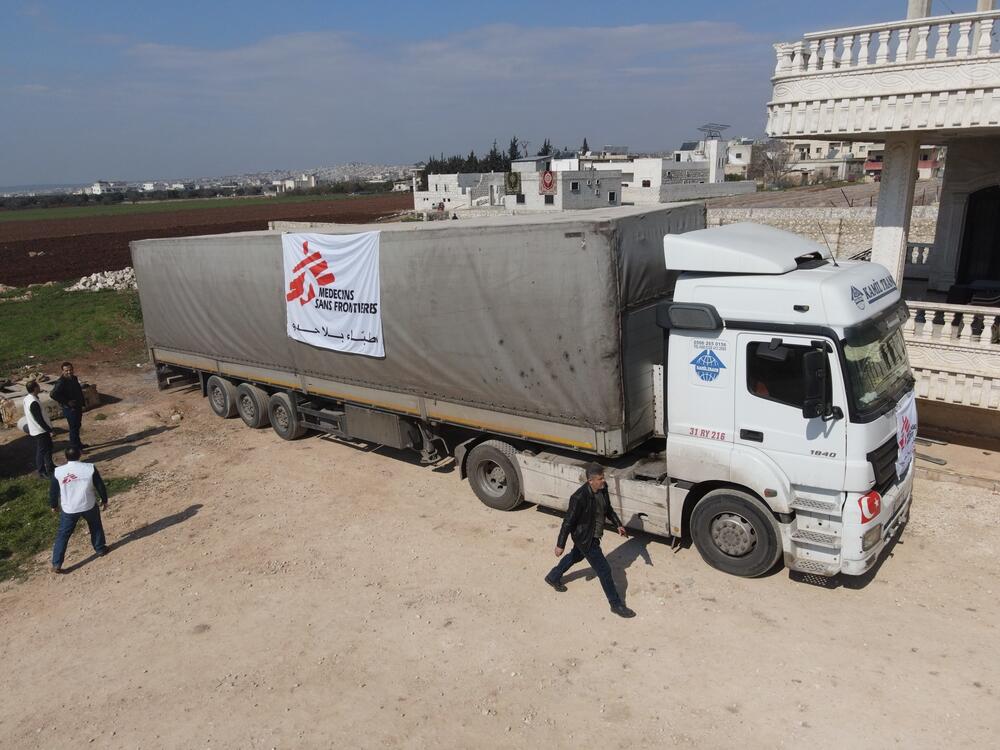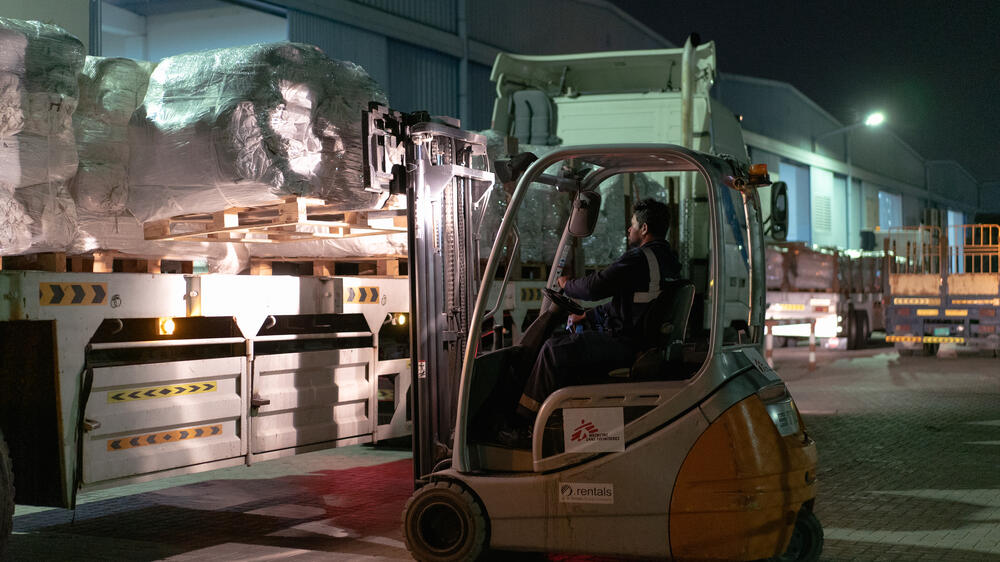Syria: MSF aid convoy enters earthquake-hit northwest
A Médecins Sans Frontières / Doctors Without Borders (MSF) convoy of 14 trucks entered northwest Syria on Sunday, arriving from Turkey (Türkiye) through the Hammam border crossing point.
This first convoy carried 1,296 tents destined for families of five people or more left homeless by the 6 February earthquakes, as well as 1,296 winter kits to insulate the tents from the cold.
Other MSF convoys are planned to follow quickly, delivering medical and non-medical equipment.
However, MSF is now warning that an urgent increase in the volume of supplies is needed to match the scale of the humanitarian crisis.
In the ten days following the earthquake, the number of trucks that crossed the border into northwest Syria was lower than the average number for 2022.
Enormous humanitarian needs
MSF has been present in northwest Syria for more than 10 years. This meant our teams were able to immediately launch an emergency response following the disaster.
“We emptied our emergency stocks in three days, donating nearly 12 tons of surgical equipment, dressing and medicines to hospitals,” says Hakim Khaldi, Head of MSF in Syria.
“Our teams provided support to the health facilities in the area until they were exhausted. But we did not see any help from the outside. Aid is trickling in in negligible amounts for the moment.”
Our teams have identified enormous unmet needs in terms of humanitarian aid.
Access to accommodation and decent hygiene conditions are far from being granted. This comes as 180,000 people have been displaced by the earthquakes, adding to the two million displaced by 12 years of war and already living in precarious conditions.
MSF teams are currently providing relief items and medical support to people living across five reception centres in Northern Idlib. This is done via a mobile clinic team that delivers healthcare services, while we also distributed tents, water, bread, blankets, mattresses and fire extinguishers.
Activities aimed at ensuring the continuity of access to healthcare for both survivors of the earthquake and the wider population are starting next week.
Border crossings
Humanitarian aid delivered to the northwest region across the Türkiye border has not even matched its pre-earthquake average volume yet.
According to UN data, five days after the earthquakes, only 10 trucks had entered Syria through Bab Al-Hawa, a UN-coordinated border crossing for humanitarian aid.
As of 17 February, 11 days after the earthquakes, a total of 178 trucks loaded with aid from six UN agencies had crossed through Bab Al-Hawa as well as Bab Al-Salama.
However, in 2022, 7,566 trucks loaded with aid crossed from Türkiye into northwest Syria. This represents an average of 227 trucks for the same period of 11 days.
Importantly, a number of the 178 trucks were not part of the earthquake response but rather already-planned deliveries.
Even considering three days of border closure, the current volume of trucks is barely matching the humanitarian response before the disaster.
The border crossing of the MSF convoy was possible thanks to the support of Al Ameen, a Syrian organisation that has partnered with MSF. The delivery was arranged outside of the UN’s ‘cross-border humanitarian mechanism’ coordinated by the World Health Organization and which does not cover logistical equipment.
Now, MSF is calling for the immediate scaling up of assistance for people affected by the earthquake in northwest Syria, addressing the new humanitarian needs that have added to those already prevailing in the area.
Priority should be given to supplying shelters, water and sanitation equipment, and medical supplies – particularly those needed for post-operative care and to maintain continuity of care for patients with pre-existing conditions.
MSF and natural disasters
Within minutes, natural disasters such as earthquakes, tsunamis and hurricanes can overwhelm an entire population. Thousands of people can be injured or traumatised by the loss of family, friends and homes, while access to clean water, healthcare and transport can be cut off.
MSF has more than 50 years of experience delivering rapid and coordinated medical responses to protect survivors of natural disasters.

